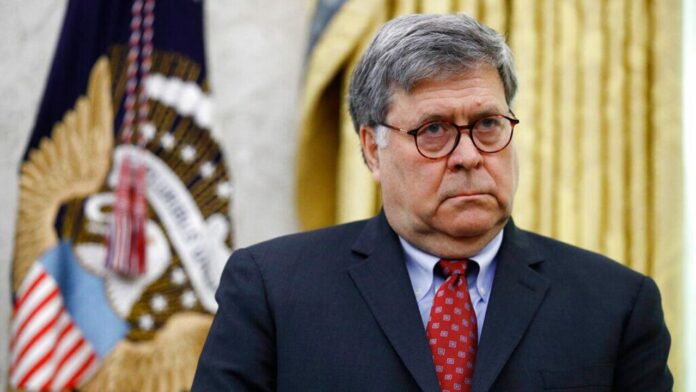A federal prosecutor has spoken out against Attorney General William Barr about his recent stances on the Mueller investigation and mail-in voting, saying that Barr has “brought shame” on the Department of Justice (DOJ).
Assistant U.S. attorney for the District of Massachusetts, James Hebert, said that he believes Barr is politicizing his department and acting as a mouth piece for President Trump.
“While I am a federal prosecutor, I am writing to express my own views, clearly not those of the department, on a matter that should concern all citizens: the unprecedented politicization of the office of the attorney general,” Herbert wrote in letter for the Boston Globe Thursday.
BIDEN BLASTS AG BARR FOR COMMENTS COMPARING CORONAVIRUS RESTRICTIONS TO SLAVERY
“The attorney general acts as though his job is to serve only the political interests of Donald J. Trump. This is a dangerous abuse of power,” he continued.
Herbert explained that he was prompted to speak out following Barr’s talk at Hillsdale College earlier this month.
Barr made headlines for comments he made when asked about the constitutionality of coronavirus mandates created during the pandemic.
The AG said that he thought states should have allowed businesses to “adapt” and enforce their own rules rather than mass lockdowns.
“Putting a national lockdown, stay at home orders, is like house arrest,” Barr said. “Other than slavery, which was a different kind of restraint, this is the greatest intrusion on civil liberties in American history.”
PENNSYLVANIA OFFICIALS CLAIM PROBE INTO DISCARDED MILITARY BALLOTS PROVES SYSTEM ‘WORKS’
But Herbert also took issue with Barr’s recently vocal stance on the validity of mail-in voting, his “misleading comments” in regards to the Mueller report and “his selective intervention in cases against political allies of the president,” likely referring to Barr’s intervention in Roger Stone’s case.
“William Barr has done the president’s bidding at every turn,” the federal prosecutor wrote.
CLICK HERE TO GET THE FOX NEWS APP
“For 30 years I have been proud to say I work for the Department of Justice, but the current attorney general has brought shame on the department he purports to lead,” he added.
The Department of Justice could not be immediately reached for comment.






